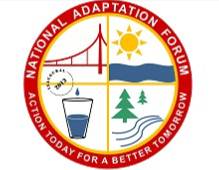 Last week over 500 people from 43 states and two territories gathered in Denver, CO for the inaugural National Adaptation Forum. These 500 represented our national climate adaptation community—folks from around the country helping people and wildlife prepare for a changing climate. I attribute it to the universal nature of the issue that the event was attended by federal, state and local government staff and officials, academics and professionals from the non-profit and private sectors. City planners, public works professionals, wildlife biologists, sustainability directors, climate scientists, insurance and hazard mitigation professionals all exchanged ideas, successes and challenges. Each brought new perspectives and innovations that crossed sectoral silos and built a common fabric upon which all of us can draw and build. I was fortunate to be a part of this seminal event.
Last week over 500 people from 43 states and two territories gathered in Denver, CO for the inaugural National Adaptation Forum. These 500 represented our national climate adaptation community—folks from around the country helping people and wildlife prepare for a changing climate. I attribute it to the universal nature of the issue that the event was attended by federal, state and local government staff and officials, academics and professionals from the non-profit and private sectors. City planners, public works professionals, wildlife biologists, sustainability directors, climate scientists, insurance and hazard mitigation professionals all exchanged ideas, successes and challenges. Each brought new perspectives and innovations that crossed sectoral silos and built a common fabric upon which all of us can draw and build. I was fortunate to be a part of this seminal event.
The program and presentations were exciting and energizing. Cities and towns throughout the nation are taking action to reduce vulnerabilities to climate change impacts which vary depending on where you are in the country. Out west, water scarcity will worsen as less snow falls on the mountains to replenish their water sources. Wild fires are becoming more frequent and severe. Coastal areas face sea level rise, higher storm surges and salt water intrusion. Here in Michigan, we are expecting more severe droughts in the summer and larger storms in the spring and fall. Many communities are reacting to extreme events that have already occurred such as Superstorm Sandy, the 2012 drought or the Chicago heatwave. The thread running throughout the talks, no matter where a speaker was from or what issue they were focused on, is that communities should be minimizing risk. We cannot know when that big storm will come or how long a drought or heat wave will last. But we can be proactive and ready our communities for these times.
I was proud to speak on behalf of HRWC and the communities in the watershed participating in our Climate Resilient Communities project. Our work is unique in that we are approaching adaptation on a whole systems scale – the watershed. Involving the many municipalities in the watershed is challenging but innovative. And there is power in our numbers. What we can accomplish together is far greater than what any one community can accomplish on its own.
The National Adaptation Forum was the first climate adaptation event of this nature and, exceeding the expectations of the conference organizers, generated tremendous interest. Twice as many presentations were submitted as could be accommodated. Registration closed long before the conference and a long wait list formed. As conference organizer and plenary speaker Lara Hansen of EcoAdapt stated, we are part of the “adaptation vanguard”- a group of forward-thinking individuals at the front lines of a growing movement. This made me feel hopeful. I hope it does the same for you.



